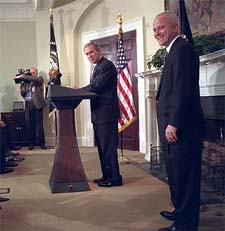
|
Faith Initiative to Woo U.S. Voters
Those who attended received follow-up letters, on GOP stationery, explaining how to apply for grant money. Ron Thomas, the party's political director, called the event a "phenomenal success" that helped "put a human face on the party again." Bush has repeatedly said the faith-based initiative is not political. On Feb. 1, when he announced that Jim Towey would replace John J. DiIulio as head of the program, the president said Towey "understands there are things more important than political parties. And one of those things more important than political parties is to help heal the nation's soul." White House spokeswoman Ann Womack said in an interview that Towey will talk to anyone about the initiative, regardless of political affiliation. "The bottom line is that Jim travels all over the country to talk about the president's faith-based initiative," she said. She cited a Manhattan appearance attended by Democratic Reps. Charles B. Rangel and Anthony D. Weiner, although she could not cite an example of joint appearances with Democrats facing tough election fights. Some lawmakers who opposed the president's faith-based initiative say they feared that it could be used for political purposes. "Madison and Jefferson understood the lesson of human history -- that when you start combining the power of politics and the power of religion, you end up with politicians using religion as means to their own ends," Rep. Chet Edwards (D-Tex.) said. Another critic of the initiative, Barry Lynn of Americans United for Separation of Church and State, said, "The Bush administration has been fishing for African American voters, and faith-based funding looks like the answer to their prayers." Possible grants, he said, "are being dangled to select church pastors in the African American community as a kind of lure, with the expectation that those churches will get out and support Republican candidates." In Kentucky, Rep. Anne M. Northup (R) -- facing a tough reelection campaign -- invited Towey to explain the grant program's potential when she toured a heavily black section of her district near Louisville. The August 29 visit focused on the church-based Shiloh Community Renewal Center. Northup, a member of the House Appropriations Committee, recently won approval for a $ 400,000 grant to the center. The grant was part of the regular appropriations process and not from the new "compassion fund," but Towey described the center as "a model of what a faith-based organization can be." Northup, who won $5 million in earmarked grant money primarily for projects in black neighborhoods, said in an interview, "There is a long tradition in the minority community of just voting almost universally Democratic." She recalled losing black precincts by vote margins as high as 525 to 25. "I don't think you change a 30- or 40-year pattern of voting in a short period of time, but I do criticize the Republican Party for not fighting for those votes." In South Carolina, where the GOP is fighting to keep the Senate seat being vacated by Strom Thurmond, the state party sponsored a "seminar on Faith-Based and Community Initiatives" primarily for black ministers in the Columbia area. Jeremy White, director of outreach for the White House Faith-Based Initiative, gave the keynote speech. Ten days later, Thomas, the state GOP political director, sent each attendee a packet with detailed information on "all the points of contact for faith-based offices . . . and information on the Compassion Fund." Thomas provided material about a company called Nehemiah Communications "that can help you and your organization set up your nonprofit status or help with grant writing." In an interview, Thomas said the seminar was "not necessarily a political event." He said it drew about 300 of the 1,600 mostly black ministers who were invited, and it "got huge press coverage, press and TV. It was a great, great success." Towey, meanwhile, has appeared this summer with other Republican candidates in close elections, including Reps. Shelley Moore Capito (W.Va.), Rob Simmons (Conn.) and John M. Shimkus (Ill.), as well as Sen. Tim Hutchinson (R-Ark.). In July, Towey joined Hutchinson to tour Dorcas House, a shelter for abused women and children in Little Rock. They met with officials of more than 20 religious charities who, according to the Associated Press, voiced concerns "about accountability and expressing their respective faiths while receiving government funds." Towey told the gathering, "The government shouldn't ask 'Does your organization believe in God or not?' . . . It should ask 'Does your organization work?' " In early August, Towey joined Shimkus at the Community Hope Center in Cottage Hills, Ill., where the two met with 60 religious leaders from the area to discuss the program. Towey praised such programs as Catholic Charities and the Salvation Army, and told the gathering, according to press accounts: "These groups have typically been stiff-armed by the government. . . . The only questions ought to be: 'Are you changing people's lives?' and 'Will you follow the federal rules?' " In mid-August, the Charleston, West Virginia.,Gazette reported that Towey joined Capito to present a $25,000 check to the Kanawha Institute for Social Research and Action Inc., a church-based nonprofit program offering computer training classes at the Ferguson Baptist Church in West Dunbar. On August 20, Towey helped Simmons pass out meatloaf dinners at St. Paul Episcopal Church's soup kitchen in Willimantic, Connecticut. Simmons said the faith-based program is not "a system that replaces government. It's designed to be a system that embraces government." |
 Bush announces conservative Jim Towey to head his 'faith-based initiative'
Bush announces conservative Jim Towey to head his 'faith-based initiative'